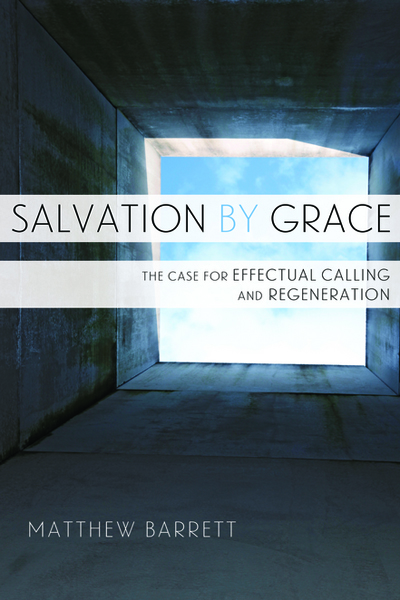
Matthew Barrett
Reviewed by: D. Patrick Ramsey
Salvation by Grace: The Case for Effectual Calling and Regeneration, by Matthew Barrett. P&R, 2013. Paperback, 417 pages, list price $24.99. Reviewed by OP pastor D. Patrick Ramsey.
Matthew Barrett, assistant professor of Christian studies at California Baptist University, has written a fine book on the Reformed doctrine of monergistic regeneration. This doctrine, which Barrett says is the key difference between Calvinism and Arminianism, teaches that God alone regenerates (imparts new life to) sinners, so that they will respond positively to the gospel. By contrast, synergistic regeneration teaches that God regenerates on the basis of the sinner's response to the gospel. The difference between these two positions is stark. The Calvinist believes that God makes the determinative decision in salvation, while the Arminian gives that role to the sinner.
After a historical sketch in chapter 1, Barrett defends monergistic regeneration from a biblical and theological standpoint against contemporary Arminians and a modified position recently espoused by Millard Erickson, Gordon Lewis, and Bruce Demarest. To accomplish his goal, the author examines the doctrines of total depravity and spiritual inability (chapter 2), effectual calling (chapter 3), and regeneration (chapter 4). He then summarizes (chapter 5) and critiques (chapter 6) the Arminian position. Finally, he considers the modified position (chapter 7).
As far as the readers of New Horizons are concerned, the author is preaching to the choir. Monergistic regeneration is not a controversial subject in the OPC. This is not to say that everyone will agree with everything in the book. For instance, this reviewer takes exception to Barrett's view on the presence of the Holy Spirit in the Old Testament. Nevertheless, this is a very good book and, for a number of reasons, a useful one even for people already convinced of its main message.
First, the comprehensive and cogent biblical presentation will reinforce this important truth and help you articulate it to others. Second, it will help you understand the diversity of the Arminian position. Barrett is careful to note and address the various opinions, interpretations, and nuances among Arminian theologians. In this regard, I wish the author had interacted with the Arminian interpretation of Scripture more throughout the book, instead of mostly dealing with it in the later chapters. Third, it will inform you of a recent modified view and show that, despite a claim to the contrary, this new view cannot be considered Reformed. Lastly, this book will remind you that the glory of God is at stake in this debate. While the author may overreach when he says that the Arminian position robs God of all his glory in salvation (p. 277), he is certainly correct in arguing that "only monergistic grace can fully preserve the sovereignty, glory, and majesty of God" (p. xxvii).
This book is an abridged version of the author's doctoral dissertation. As such, it is a lengthy, technical book, filled with quotations and footnotes. But do not let this intimidate you, because it is clearly written. If you are interested in this subject, then this would be a book worth reading.
January 18, 2026
January 11, 2026
Texts that Transform: Church and Ministry
January 04, 2026
December 28, 2025
December 21, 2025
December 14, 2025
December 07, 2025
© 2026 The Orthodox Presbyterian Church